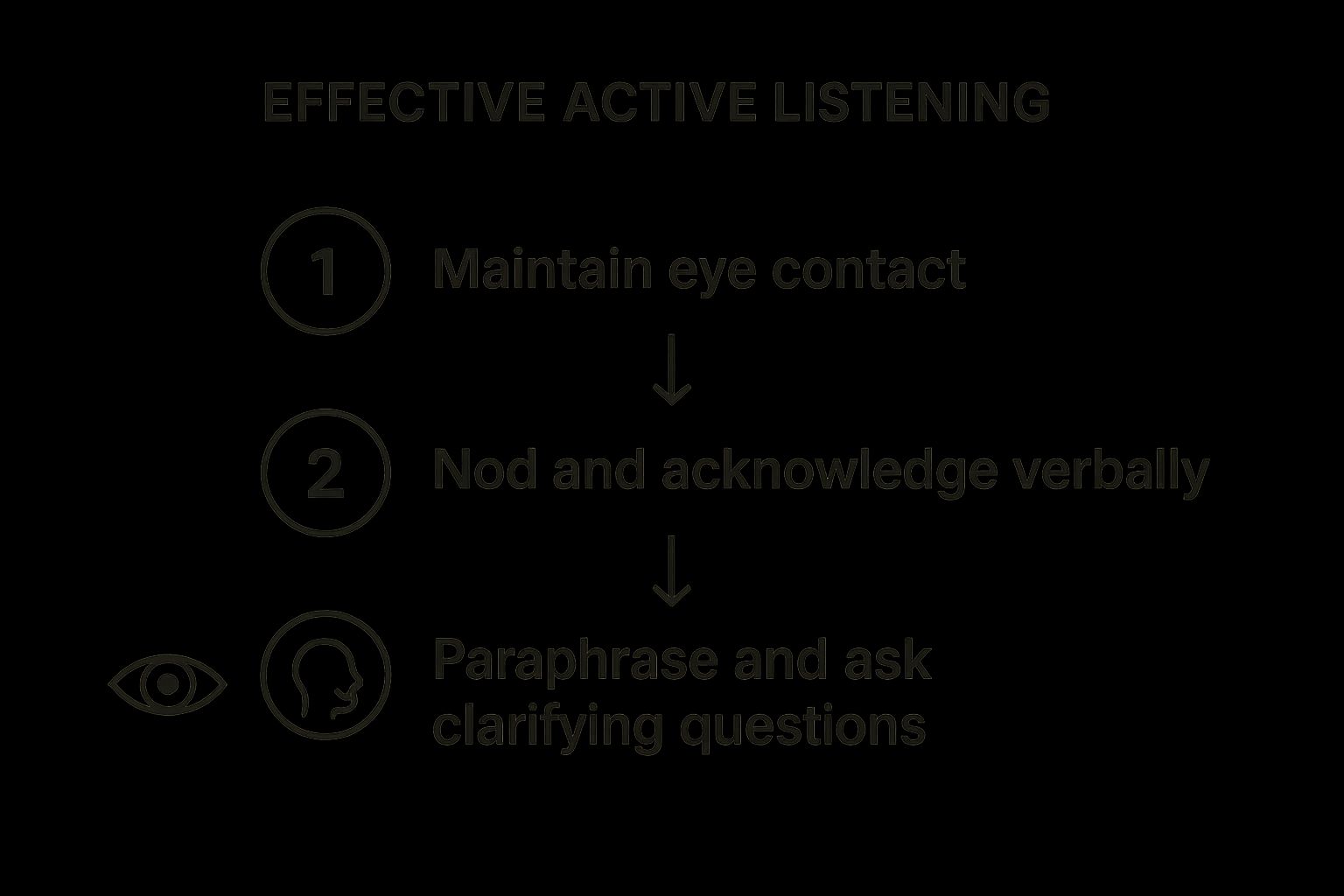Create Your Own AI Girlfriend 😈
Chat with AI Luvr's today or make your own! Receive images, audio messages, and much more! 🔥
4.5 stars

Becoming a better conversationalist isn't about some grand, overnight transformation. It's really about weaving small, consistent habits into your daily life. The goal is to shift your focus from performing to simply being present. When you do that, every little interaction becomes a chance to grow.
Why Great Conversation Skills Are Your Secret Weapon

In a world full of screens and quick-fire texts, the ability to have a genuine, engaging conversation feels less like a basic "soft skill" and more like a superpower. It's the invisible thread connecting us, quietly shaping everything from our closest relationships to our careers.
Being a good conversationalist isn't just about being chatty. It's about making the person you're talking to feel seen, heard, and understood. This skill pays off in real, tangible ways. Think about it—every job interview, first date, networking event, or tough conversation comes down to how well you communicate. Mastering this art is what makes the difference between leaving a lasting impression and being forgotten.
The Real-World Impact of Better Conversations
The value of solid communication isn't just a nice idea; it's a proven asset for career growth. Recruiters and hiring managers are constantly on the lookout for it. In fact, a staggering 57% of global employers point to communication as the most crucial skill they look for. More specifically, 55% of recruiters prioritize strong verbal communication skills above almost everything else. You can dig into more of the numbers on why communication is a top workplace skill.
This tells a clear story: your ability to connect with others and get your ideas across is a major driver of professional success. But the benefits don't stop when you clock out.
- Deeper Personal Relationships: The best connections are always built on open, honest dialogue.
- Increased Confidence: The more you successfully navigate conversations, the more self-assured you'll feel in any social situation.
- Effective Leadership: True leaders don't just command; they inspire action and build trust through clear, empathetic communication.
Here's the secret: the goal isn't to become a perfect, flawless speaker. It's to become a better listener and a more present, authentic communicator. Once you make that mental shift, the pressure to perform melts away, and you can start building real connections.
Mastering the Core Elements of Everyday Conversations
Let's get one thing straight: becoming a better conversationalist doesn't happen by preparing for some big, high-stakes speech. It's built in the small, everyday moments. I've found that it really comes down to a simple, repeatable cycle: Listen, Question, and Share. If you can get comfortable with these three pillars, you can turn any quick chat into a genuine connection. It all starts by shifting from just hearing sounds to actually listening to what someone means.
Active listening isn't just about being quiet while the other person talks—it's a full-body sport. It’s how you show someone you’re truly present and tuned in. This simple visual guide breaks down the physical side of making someone feel heard.

As you can see, great listening is a journey. It moves from silent nods and acknowledgments to verbal cues that confirm you’re on the same page, making the other person feel genuinely understood.
Asking Better Questions to Deepen Connection
Okay, so you're listening intently. What's next? Asking better questions. This is where so many conversations fizzle out. We get stuck asking questions that can be answered with a simple "yes" or "no," which is a total momentum killer.
The trick is to lean into open-ended questions that invite people to open up. Think words like "how," "what," or my personal favorite, "tell me about."
For instance, instead of the default, "Did you have a good weekend?" try something like, "What was the most interesting part of your weekend?" That small tweak is an invitation to tell a story, not just give a one-word reply. It signals real curiosity and gives them a stage to share something that actually matters to them.
The goal isn't to interrogate someone. It's to show you're genuinely interested. A great question makes the other person feel like the most fascinating person in the room.
Finding Low-Stakes Practice Opportunities
The best way to build this muscle is to practice in situations where the pressure is off. You don't need a formal networking event; your daily routine is filled with chances to work on these skills.
Here's a breakdown of simple, everyday scenarios where you can practice without feeling like you're on stage.
Low-Stakes Daily Conversation Practice Opportunities
| Scenario | Skill to Practice | Example Question or Action |
|---|---|---|
| Ordering Coffee | Asking open-ended questions | "What's your most popular drink today?" or "That latte art looks amazing, how did you learn to do that?" |
| Grocery Store Checkout | Sharing a brief, relevant thought | "Wow, you're flying through these items. It must get busy in here on Saturdays." |
| Walking Your Dog | Making a simple observation | "Your dog has so much energy! What kind of breed is he?" |
| Waiting for an Elevator | Showing curiosity | "That's an interesting pin on your bag. What's the story behind it?" |
Using these tiny interactions helps you build a rhythm and gain confidence. Each one is a small win that makes the next conversation feel a little bit easier.
Sharing Your Experiences to Build Rapport
Now for the final piece: sharing a bit of yourself. Remember, a conversation is a two-way street, not an interview. After you've listened and asked a good question, look for a natural moment to connect their experience to one of your own. The key here is to keep it brief and relevant.
This isn't about one-upping them.
- If they talk about a tough hike, don't immediately jump in with a story about the time you climbed a bigger mountain.
- Instead, try sharing a related feeling. You could say, "That sounds intense! I remember feeling completely wiped after a hike last year, but the view from the top made it all worth it."
See the difference? This approach builds real rapport by showing you get it—you're sharing an emotion, not competing.
For anyone who wants a safe space to practice this kind of back-and-forth, there are even tools that let you chat with an AI girlfriend. They can provide a no-pressure environment to find your conversational flow. Ultimately, it’s all about creating a balanced exchange where both people walk away feeling seen and valued.
Cultivating Human Skills in an AI-Driven World

As AI and automation handle more of the routine stuff, our most human qualities—like empathy, intuition, and emotional intelligence—are becoming our greatest professional assets. Learning how to practice conversation skills isn't just about mastering small talk anymore. It's about sharpening the very abilities that machines can't replicate.
This really boils down to paying attention to the unspoken parts of communication. It’s about catching the subtle cues in a coworker's face on a video call or picking up on the hesitation in a friend's voice. These are the skills that build genuine trust and turn quick, transactional chats into meaningful connections.
According to the World Economic Forum, as AI gets more sophisticated, the demand for human-centric skills will only grow. Things like analytical thinking and complex problem-solving are expected to be critical, but they all lean on an emotional intelligence that tech just can’t mimic. You can read more about these crucial human skills and see why they're so important for the coming years.
Building Your Empathy Muscle
Think of empathy as a muscle you need to train. It's about consciously trying to see the world from someone else’s perspective and listening for feelings, not just facts.
Start by making an effort to identify the emotion hiding behind someone’s words. If a team member says, "This project is challenging," what are they really feeling? Frustration? Excitement? A touch of anxiety? Instead of just nodding, try gently reflecting their potential emotion back to them.
- Verbal Reflection: "It sounds like you're feeling a bit overwhelmed by the scope."
- Open-Ended Follow-Up: "What part of it feels the most daunting right now?"
Simply naming the emotion shows you're tuned in on a deeper level. It creates a space where people feel safe enough to be honest.
The real power move in any conversation is making the other person feel truly understood. This isn't about being perfect; it's about being present and human—your ultimate advantage in an increasingly automated world.
Mastering this takes practice, ideally in a low-stakes setting. For anyone looking to sharpen their conversational abilities, exploring an AI girlfriend API can provide a unique space to experiment with different communication styles without real-world pressure. It's a way to build confidence in a controlled environment before you take these skills out into your daily life. See more at https://www.luvr.ai/ai-girlfriend-api.
Build Your Confidence with Structured Exercises
Spontaneous daily chats are valuable, but if you really want to level up your conversation skills, you need a dedicated practice routine. Think of it as a gym for your social skills—a safe space where you can experiment, make mistakes, and build strength without the pressure of a real-world audience.
This kind of focused practice gives you a way to track your progress and build a foundation of genuine confidence. It’s a bit like a musician running through scales before attempting a complex symphony; you’re mastering the fundamentals first.
The Power of a Practice Partner
One of the best ways to get started is to find a trusted friend to act as your conversation partner. This isn't just another casual chat—it's a deliberate exercise with clear goals.
- Schedule It: Set aside just 15-20 minutes a week. The consistency is what truly matters, not the duration.
- Pick a Topic: Decide on a simple, low-stakes subject beforehand. It could be anything from "a movie you recently enjoyed" to "weekend plans."
- State Your Goal: Be specific. Maybe your goal is to ask more engaging follow-up questions, or perhaps you want to cut down on filler words like "um" and "like." Tell your partner what you're working on so they can give you focused feedback.
Having this dedicated time takes away the anxiety of performing on the spot in a high-stakes social situation. It creates a supportive environment where you can stretch your abilities. In fact, research shows that structured practice opportunities, especially with a partner, can significantly boost a person's confidence. One study highlighted how a conversation partner program helped participants feel more self-assured when speaking. You can read the full study on conversational confidence here.
Fine-Tuning Your Skills with Solo Drills
You don't always need a partner to practice. Solo exercises are fantastic for honing the way you articulate your thoughts and tell stories.
A great one to try is the Storytelling Drill. Find a short article, listen to a podcast segment, or watch a scene from a show. As soon as you're done, try to summarize the key points out loud in 60 seconds. This exercise is a workout in being concise, clear, and engaging.
You can take this a step further by using the voice recorder on your phone. Record yourself doing the storytelling drill or simply talking about your day.
When you play it back, listen with a curious ear, not a critical one. What do you notice about your pacing? Your tone? Are there any filler words that pop up repeatedly? This kind of self-awareness is the bedrock of real improvement.
These structured methods transform vague ambitions into concrete, actionable steps. If you’re ready to put these ideas into practice, you can find more ways to sharpen your skills with our daily AI conversation challenges.
How to Navigate Difficult Conversations with Poise

Let's be honest, high-stakes conversations are never easy. Whether you're asking for a raise, giving tough feedback, or trying to sort out a conflict, the pressure can feel immense. But you absolutely can learn to handle these moments with grace and confidence.
The secret isn't about winning an argument; it's about shifting your mindset from confrontation to collaboration. It all starts before a single word is spoken.
First, get really clear on what you want to achieve. What does a successful outcome actually look like? Take a minute and write it down. This isn't a script to memorize, but rather a compass to keep you pointed in the right direction when things get tense.
Then, put yourself in their shoes. Seriously. What are their goals? What might they be worried about? Walking into the conversation with genuine empathy can completely change the tone and make the other person much more open to what you have to say.
Staying Grounded During the Conversation
Once the talk begins, the words you choose have a huge impact. One of the most effective things I've learned is to use neutral “I” statements. This lets you express your feelings without making accusations.
- Instead of saying: “You never listen to my ideas.”
- Try this: “I feel unheard when my suggestions aren't acknowledged in meetings.”
See the difference? It’s a small shift, but it frames the issue around your experience, inviting a discussion instead of starting a fight. It makes it a shared problem to solve.
I've found the most crucial skill in a tough conversation isn't talking—it's listening. Even when you completely disagree, focusing on understanding where they're coming from can instantly de-escalate tension and open the door to a solution.
If you feel the conversation getting too heated, don't be afraid to hit the pause button. It's perfectly okay to say, “This is an important topic, and I want to make sure we give it our best. Can we take a five-minute break?”
This simple move gives everyone a chance to cool off and come back ready to find common ground. Mastering these tough moments is a massive part of learning how to practice conversation skills that truly matter in the real world.
Answering Your Questions About Conversation Practice
Even with a solid plan, I know that taking the first step can feel like a huge leap. It's completely normal to have some lingering questions or feel a bit hesitant. Let's walk through some of the most common mental roadblocks I see people run into, so you can start practicing with more confidence.
A big one I hear all the time is whether it's even possible to get better at conversation if you're naturally shy or anxious. The answer is a resounding yes. Progress here is about strategy, not trying to change your personality.
How Do I Practice If I Have Social Anxiety?
The trick is to start small, in situations where you feel you have some control. Don't throw yourself into a crowded party—that's like trying to run a marathon on day one of training. It’s a recipe for feeling overwhelmed.
Instead, ease into it with low-pressure interactions.
- Start with text-based chats. Find an online group centered around a hobby you love, like a book club or a gaming community. The focus is on the shared interest, which takes the pressure off you.
- Move on to structured practice. Ask a trusted friend or a family member if you can chat for a few minutes. You're not aiming for a perfect conversation, just a comfortable exchange.
- Celebrate the small victories. A brief, pleasant chat with a barista or a cashier totally counts. Each positive interaction is a small piece of evidence that you can do this, and that proof builds momentum.
This gradual exposure method is incredibly effective because it lets you build confidence at your own pace without triggering that fight-or-flight response.
Where Can I Find a Practice Partner?
This is often easier than people think. You'd be surprised how many people are happy to help a friend who's working on self-improvement. Just ask a supportive friend if they'd be up for a 15-minute chat once a week, specifically to help you practice.
Another great option is to find groups where communication is just part of the activity. Organizations like Toastmasters are built for this, providing a supportive structure where everyone is there to learn. Local hobby meetups are also fantastic—think hiking clubs or board game nights.
From my experience, the biggest mistake people make is getting stuck in their own heads, worrying about what to say next. Try shifting your goal from "sounding smart" to genuinely "understanding the other person." When you listen with real curiosity, you’ll find that the right questions and responses start to flow much more naturally.
Most people start to feel a real difference within a few months of consistent, deliberate practice. Progress isn't about one intense, perfect conversation; it's about showing up consistently. It's a journey, for sure, but those initial wins often come faster than you might expect.
Ready to start practicing in a fun, judgment-free environment? Luvr AI offers a unique space to interact with lifelike AI characters, helping you build conversational confidence at your own pace. Explore different personalities and scenarios to find your flow.



